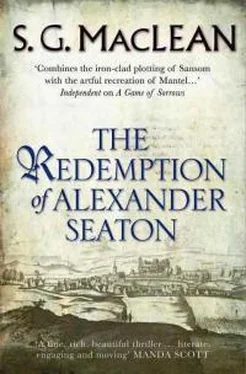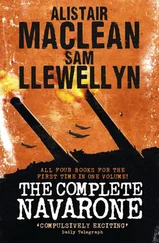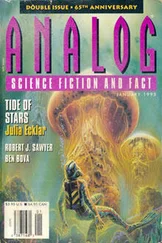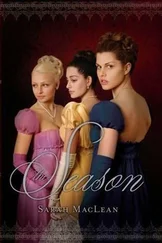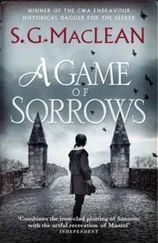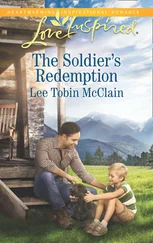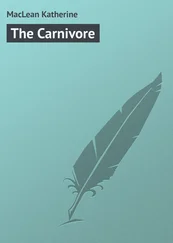The room itself was scarcely less bare than the walls. The only furnishings were the two hard wooden chairs on which Charles Thom and I sat and the table and bench to the side of the room. A kist with a strong lock – keeping the papers of business, I assumed – was below the one small window. There was no rug or matting on the swept wooden floor, and no ornament of any sort – what bowls and plate there were were either wooden or of coarse, local work, not burnished or painted. A low bookshelf was set against one wall, and it was to this that I gave my attention. It was from here that Buchan had picked the Bible as he had gone to his rest, yet another Bible remained. I took it from the shelf and opened it. Inscribed inside, in a thin and uncertain hand were the words: To William, walk always in the fear of the Lord and in the certainty of your mother’s love, Isabella Farquhar. 1596 . The baillie could scarce have been ten years old when his mother had given him that Bible. But more, I realised that whoever had stitched those words that had condemned him to a lifetime of arid loneliness, it had not been his mother.
This was not the place to set my mind to that mystery and I resumed instead my examination of the baillie’s small library. The Psalms. Some tracts and pamphlets against the Catholics, the Jesuits, the government of bishops and the perils of assuming one’s own will, all in the vernacular. All as I would have expected, all save one. For William Buchan too had an edition of Craig’s poetical works, identical to that I had bought for Charles so recently in Aberdeen, yet this copy was well thumbed, well used, evidently oft read. This was not a man whom I thought poetry could have touched. As I wondered at this, my foot struck against another kist, long and low, beneath the shelf. On this one there was no lock. I bent down and opened the lid as quietly as I could. Inside, bound together, were little exercise books such as I would allow the better pupils to keep, like diaries or commonplace books. I carefully unbound the pile nearest the top and took the first book in my hand. On the front was written, in the baillie’s small and steady hand, ‘Sermons, March 1624–June 1625’, and inside there were notes and meditations on every sermon he had heard in those fifteen months. The whole pile of notebooks beneath it went back year upon year, month upon month, week upon week as far as my own childhood and beyond. A lifetime of the man was in those books, and I would have given much for the freedom to peruse them, but I was too conscious of the low, rasping breathing coming from just the other side of the door.
I could not help but open the most recent exercise book, though. The baillie had attended the kirk in Banff, mostly, but he had travelled too, all around the presbytery. He had found much to praise, many words of wisdom on which to meditate and to thank the Lord for, but he had found more to censure. Laxity in discipline, ignorance of the true meaning of the scriptures, error in the interpretation of God’s plan. Most of all, though, there was near a fury, fury at the ignorance, incompetence, and hypocrisy of the Reverend Guild. I could disagree with nothing he said of Guild’s preaching. Then a thought struck me. I rifled backwards through the pages and indeed it was there: 22 June, year of God one thousand six hundred and twenty-five. Mr Alexander Seaton, undermaster at Banff Grammar School, expectant for the ministry. At Boyndie Kirk .
Yes: he had been there. As I had taken the pulpit and looked down across my last congregation, I had seen, watching me with a peculiar intensity, Baillie William Buchan. Unaccountably, I felt my breathing come heavier and my hand tremble slightly as my eye scanned the first line and then the second. At first I could not quite comprehend what I read, could not take it in, and I had to go back over the words again until I was certain of what they said. There, in my hand, in the home of a man I had long avoided, maligned and misunderstood, I read a testament to hopes dashed and faith betrayed: William Buchan had given thanks to the Lord for the gifts He had given me, as a preacher and minister to his people, for preserving me where others had been lost, as a blessing to my community and a comfort to my friends. He had thanked God that the promise he had seen in the boy I had been had been fulfilled in the man I had become. My heart was racing and I read on, disbelieving until, out of nowhere, came a most awful hammering noise, fit to wake the dead. I scarcely had time to shut the book and throw it back in the pile at the top of the kist before the baillie came stumbling from his chamber, dishevelled from sleep. He wrenched his cloak from the back of the door and lurched towards the stairs. I hastily shut the lid of the kist and went to stand by Charles, who was also drowsily coming to; I was ready to defend him if I had to.
There was some commotion downstairs as the arrival strove to make himself understood to the crone, and then to get past her to the baillie. I should have relaxed at the voice, but my heart beat faster, for it could not be good news that drove him to this place, now, and in such a manner. There was shouting, insistent shouting, and the baillie trying to assert calmness, authority. At last he made himself understood, and I heard the men ascend the stairs. Charles tried to stand up, but his time in the tolbooth had weakened him greatly and he was far from his usual strength. It was not the baillie who came first through the door but Dr James Jaffray.
‘Alexander,’ he said, not comprehending that I should be there, and then his face changed and his body visibly sank as he saw Charles behind me. He took a pace towards us. ‘Oh, my boy, my dear boy.’ The baillie helped him to a chair and Charles knelt down at his feet, taking his hands. William Buchan, unused as he must have been to such displays of human feeling, stepped back into his chamber and, without fully closing the door, began to tidy himself. I poured some water for the doctor from the pitcher on the table.
‘Drink this, James; it will settle you.’
He rubbed his hand across his eyes and as the heaving of his chest subsided, he took the tumbler from me and drank. When his old friend had recovered himself, Charles allowed himself a smile.
‘Well, doctor, would it be an irate husband or a desperate creditor that chased you to the baillie’s in such a spin?’
The doctor also smiled and put down the tumbler. ‘No, but only two daft lads that are not safe to vague the streets on their own.’ He shook his head in a mock weariness. ‘There is nothing for it but I must find you both a wife to keep an eye on you, for I have work aplenty to keep me busy as it is.’
‘Just the one wife between us?’ asked Charles.
‘Aye, perhaps,’ replied the doctor, ‘and lucky to get that.’
A hacking cough broke into their pleasant banter. ‘Perhaps,’ said the baillie, ‘we should come to the matter in hand.’ Charles stood up and I stood aside to let the baillie pass. ‘The doctor has just told me now what I believe you already know, Mr Seaton. He has told me that by his findings, Marion Arbuthnott was no suicide but died by the same hand that killed Patrick Davidson.’
I nodded. ‘Yes, the doctor told me that this morning.’
‘What you will not have realised,’ continued the baillie, ‘perhaps because you would entertain no idea of his guilt in the first place, is that this proves, in as far as the thing can be proved, the music master innocent of the first crime as well as of the second.’
I looked from the baillie to Jaffray, the realisation only gradually dawning. Neither of us had thought of it, because neither of us had believed for a minute that Charles had murdered Patrick Davidson. It had been alone, in the peace and quiet of his little back room, looking out through the window at his wife’s garden, that the doctor had at last seen it. This was the proof that would, in the sight of others, free Charles from the tolbooth and from the hangman’s noose. Charles sat down again and held his head in his hands.
Читать дальше
